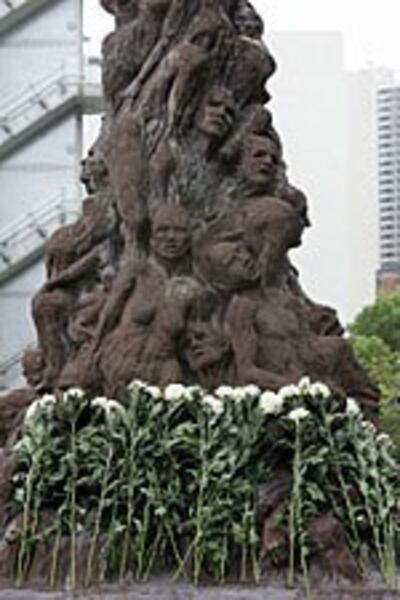
HONG KONG—In the run-up to the 16th anniversary of the June 4, 1989 Tiananmen crackdown, calls are once more being heard inside and outside China for an official reassessment of the military crackdown on the student-led pro-democracy movement.
Those with the most potential to influence Chinese public opinion are groups such as the Tiananmen Mothers, who this week wrote an open letter to Chinese President Hu Jintao ahead of Saturday's anniversary.
¥??"?time, Deng Xiaoping and a small group of top Chinese leaders got together and decided to refer to their military action as the suppression of a counter-revolutionary rebellion," said the letter, published on the Internet by overseas rights groups.
"And yet all over the country and in the international community, people refer to it as 'June 4th,' or 'The Tiananmen Massacre,'" said the letter, signed by Ding Zilin—a prominent campaigner who lost her 17 year-old son in the crackdown—and more than 100 other relatives of those killed and injured.
A people that forgets its history is a people without a future.
Hundreds, perhaps thousands, are thought to have died when People's Liberation Army troops wrested back control of central Beijing from the student-led pro-democracy movement, using tanks to crush their encampments and barricades, and firing liberally into crowds of unarmed civilians.
The open letter called on the Chinese government to recognize the same need for accountability and redress regarding June 4 as it is demanding from the Japanese government regarding the Nanking Massacre (1937-38). Historians agree that at least 150,000 people died when Japanese imperial troops went on a frenzy of rape and slaughter in Nanjing lasting several months.
In Hong Kong, which will continue its tradition of honoring the 1989 dead with a candlelit vigil in Victoria Park this year, hundreds marched to China's representative office in the former British colony, which returned to Chinese rule in 1997.
Hong Kong calls for fresh verdict
Holding banners that read "Vindicate the 1989 pro-democracy movement!" and shouting "End authoritarian rule, build a democratic China!", the rain-sodden marchers also called on the Chinese government to reassess the official verdict.
"Some people say we should forget about June 4 and look to the future," veteran pro-democracy politician Szeto Wah told demonstrators at the start of the march in Victoria Park.
"But looking to the future means not forgetting June 4," Szeto, a former legislator and current chairman of the Hong Kong Alliance in Support of the Patriotic Democratic Movement in China, said.
Deng Xiaoping and a small group of top Chinese leaders got together and decided to refer to the military action as the suppression of a counter-revolutionary rebellion.
"A people that forgets its history is a people without a future. Being forward-looking is about taking care of that future. This is a struggle for our future," he told the crowd.
The calls for a re-appraisal of the massacre in the interests of the "harmonious society" promoted by Hu and his premier, Wen Jiabao, are unlikely to get past tight state control of the media inside China.
But official fears that such views may spread among thousands of ordinary citizens left disaffected and economically stranded by growing social inequity are clear: those with a connection to the 1989 movement are traditionally held under tight police surveillance or detained by officials around such a sensitive anniversary.
Rights groups say resolution needed
Overseas rights groups supported the Tiananmen Mothers' letter.
"China cannot hope for a harmonious society until it achieves resolution on nagging issues such as June 4th, which will remain a thorn in public consciousness until justice is served," the chairman of the New York-based Human Rights in China, Liu Qing, said in a statement.
Tens of thousands of people continued to be detained or imprisoned in violation of their fundamental human rights and were at high risk of torture or ill-treatment.
Human rights abuses in China remained "serious and widespread" in 2004 despite a constitutional amendment protecting rights and legal efforts to stamp out torture and police brutality, Amnesty International said in its annual report last week.
"Tens of thousands of people continued to be detained or imprisoned in violation of their fundamental human rights and were at high risk of torture or ill-treatment....Thousands of people were sentenced to death or executed, many after unfair trials," the report said.
The rights of freedom of expression and workers' representation continued to be severely curtailed, it said.
"In the context of economic restructuring, large numbers of people were reportedly denied adequate reparations for forcible eviction, land requisition and job layoffs," according to the report.
Original reporting by Shi Shan and Yang Jiadai. RFA Mandarin service director: Jennifer Chou. Translated and produced for the Web in English by Luisetta Mudie.
